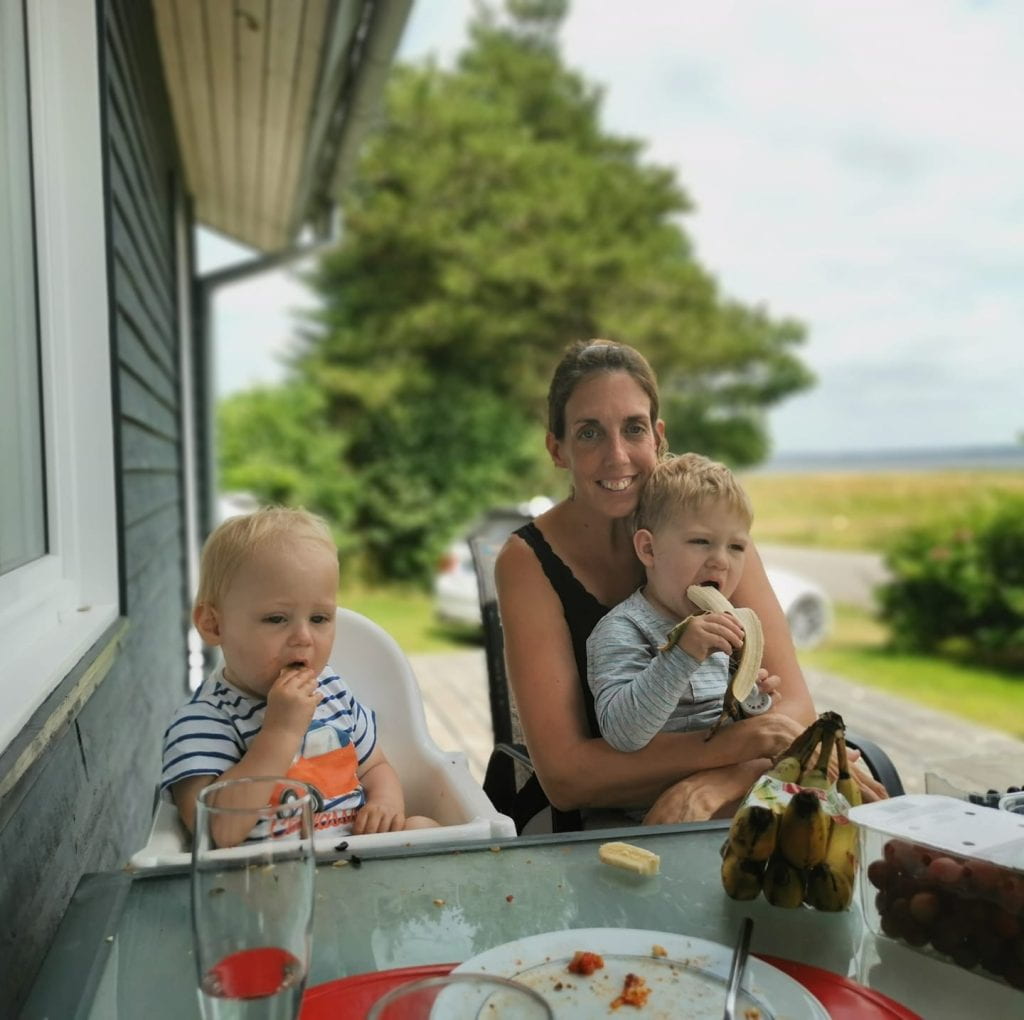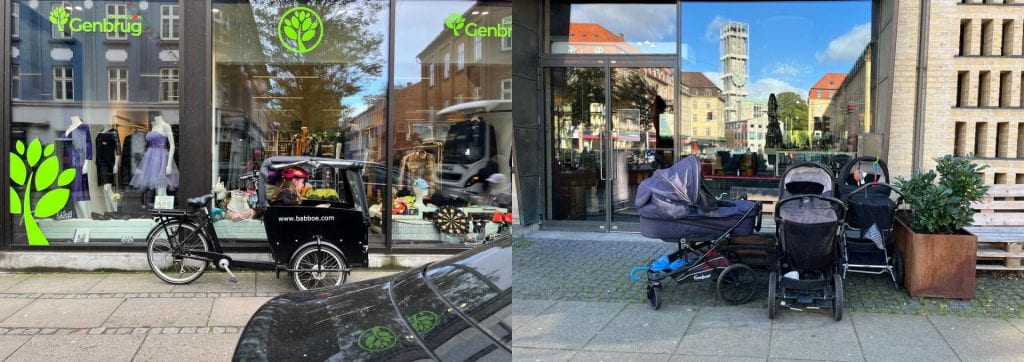Authors: Maria Luz Nochez and Donika Gashi
Motherhood challenges the marvels of the Danish welfare system/ The equal Danish welfare relies on mothers and what they should be like
After cars, strollers are the most popular four-wheel vehicles used in Aarhus. Wherever you fix your eyes, a stroller will find its way, either carried by one of the parents —most of the time a woman—, or outside of a café or a supermarket, sometimes with kids in it. While that might be considered normal in a country like Denmark where the birth rate has steadily increased between 0.86 and 0.87% per year in the last four, this goes by hand with the advertised affirmation that this is one of the countries where women have it “easier” to become mothers.
The Danish system, as stated in several websites, believes that the benefits a woman has when becoming a mother shouldn’t have to rely on social conditions or how much money she (and her partner, if that’s the case) earns. Maternity leave that starts four weeks before the child is born and is prolonged for six months after (24 weeks for each parent), free prenatal and postnatal care, monthly child allowance, and subsidized childcare services, do impact a mother’s life. As per the Mother’s Index Ranking report by Save the Children in 2015, Denmark holds the fourth position out of 179 countries regarding the welfare of mothers and children. As the report highlights, this concept of welfare consists of “very high scores for mothers’ and children’s health, educational, economic and political status.”
The importance of the notably supportive Danish work environment is acknowledged by both Danish and international women. Without the privileges a country like Denmark offers, Signe Simonsen, a 38-year-old mom of two boys (5 and 3 years old) adds that her decision to have two kids would’ve been tested. “I will say if we didn’t have these conditions, having one kid would be cool but then having two kids that would probably be very hard, and would probably make me consider it.”
Even when the welfare system is a big part when making this decision, with privileges come pressure. As Simonsen put it, “the many things we’ve been told on how to be a good mom”, referring to needs in terms of welfare being met. As someone who decided to have kids at 34 and has just taken a leadership position as a CEO, she struggles with what’s expected of her as a mom: “I find that juggling between being a leader and expectations of society very hard”.
While Danish society believes in women’s self-determination, women are still being questioned on whether they decide to have kids or not, especially if they’re doing it in their twenties. Sarah Kramer is a 30-year-old who has two kids (a 5-month-old girl and a 3-year-old boy) and who always wanted to become a mom. At 27, as a student of French Language and Literature, she got pregnant. In her mind, she was already late but was confronted with comments that tried to convince her of the opposite. She actually wanted to start having kids at 25, but “I was waiting for my partner to be ready.”
She believes that being a mom while studying at the same time was actually one of the best choices for her, because “you are able to plan your time to be more flexible, and you actually have more maternity leave when you study”.
Marie-Louise Carlslund, a 23-year-old studying to become a teacher agrees with Kramer’s point of view. She got pregnant with her first child 22, and what for her was a natural decision the public health system put a question mark. For her, being a young mom meant that she’d still have some “youth” once her kids become grown-ups, and while some believed that her young age was a positive aspect, others put her judgment to test: “Some doctors were like that’s good because your body is in great shape and you can stay up all night when baby cries. But there were also a lot of people in doubt that I would be or that I could take care of a child without even knowing me or knowing what I’ve done in life”.
As reported by Statistics Denmark, the average age of first-time mothers in the country in 2022 stood at 29.9 years. Unlike other first-time moms, because of her age, she says she was forced to go for a check-up for a year in a row to talk with a doctor about motherhood. “I don’t think that’s necessary because even when you are 27 or 30 you are also a first-time mom. It’s new for us. was quite difficult to meet with that stereotype that because I am young I can’t do it.”
For those part of the new generation, the idea of being parents in Denmark goes beyond the welfare system. Even though they recognize the privileges that they’re entitled to have as future parents, their ideas about parenthood are based on different issues. Zewa Falk (17-year-old), for instance, believes there is pressure for young women like her to become a mother someday, but that it’s not really something she’s being pushed to do. If anything, after helping her mom with her two-year-old brother she confesses “It’s a lot having a child; after she gave birth I was like no, that’s not really going to happen”. Sexual education at school has given her the basics but “a lot of information I have, I have from the internet or people I know, but I think I have gotten enough to make my own opinion about it”.

To the left Zewa Falk and to the right Barbara Fenger-Grøndahl. Photo taken by the authors
Gender identity is also a key factor in this decision for teens like Barbara Fenger-Grøndahl, a non-binary 17-year-old who wishes to be a parent “for a lot of kids” one day, but struggles with the importance that Danish society gives to the pregnant person given their identity. “Here in Denmark the thing about being pregnant is very important, it’s talked about a lot like “Wow you are shining, you’re really a woman”, they stress. As they acknowledge it will take a lot of time until they become a parent, it has crossed their mind the means by which this will happen, especially if decide to do it on their own. “It’s really a problem that I need to be pregnant”; they add. In any case, Fenger-Grøndahl appreciates having options.
Denmark’s welfare system extends its support to women and non-binary people to areas beyond parental and child welfare. It also plays a vital role in facilitating options like in vitro fertilization (IVF), and sperm and egg donation, providing valuable assistance to individuals facing challenges when conceiving or to those who prefer alternative methods to traditional family planning.
Carolina von Essen, an Argentinian living in Aarhus since 2015, has benefited from Denmark’s health system by conceiving her two children through IVF. Carolina and her former husband faced difficulties conceiving through traditional means, so they decided on IVF treatment. Despite various health challenges during her pregnancies, she describes both birth experiences as amazing. “Even though the whole process was tiring and crappy, I could have healthy babies completely for free.” Despite being renowned for having one of the most comprehensive welfare systems in the world, motherhood still poses significant challenges for which the system has its limitations, no matter how equal it pretends to be.
According to Camilla Skovbjerg Paldam, Associate Professor in Aarhus University’s, Department of Communication and Culture, Denmark is still pretty much behind the equality it claims to have. “It was not until recently that there’s a part of the leave that’s for fathers only. In most families, because still men earn more than women, in many families they tend to think that the work of a man is more important than to work of a woman. So it often ends up in women taking most of the maternity leave and it also causes a wage gap, women in the end earn much less than men in Denmark too. So I don’t think we have that much equality”.
As a result, these favorable conditions for women compared to other countries can lead to heightened societal expectations. Skovbjerg notes that “There’s still the expectation that women do most of the caring.” As a mom and a professional, she experienced the imparity in care labor, both in her personal life and with her male colleagues. “I had my first child when I was writing my Ph.D. and I could see it was a setback for my career, I could see that I couldn’t publish as much as my male colleagues”, she remembers.
As her partner at that time decided not to take a leave with any of her children, she felt alone, while among those of her male coworkers who took parental leave, it was noticeable that even when they were at home, they were not doing the same amount of care labor. “Most of them had often younger partners, and in reality, it was their partners still being at home taking care of the child and then the paternity leave it was time for writing more publications, and it was not like that being a woman on the field.”
Carolina von Essen, an ex-postdoc astrophysicist at Aarhus University, where she worked until 2021, shares the struggle of being a woman in academia with no help from a partner. By the time she had both her kids, she was only employed 20% of the time which meant she could receive the payment for maternity leave from the university. As a passionate scientist, she wanted to stick to academia but realized the numbers didn’t favor her. “If you look at the statistics in the department I was working, out of 44 permanent staff, only one was a woman and she was Danish. So the reality was that there was no space for me”. von Essen then made a personal choice to “work very very hard these last years and see if they can the value in me”. Instead of publishing one paper a year, as stated in her contract, she published four per year for three years in a row.
She was working while pregnant and after giving birth to both of her kids, without her ex-husband’s help. The work-life balance was non-existent during that time and the reward didn’t go as expected. “The only thing the head of the department did was to acknowledge my effort with a sort of very small prize and that’s it”.

Carolina von Essen with her kids Noah and Liam (4 and 2 year-old). Picture provided by von Essen.
Von Essen then decided to quit and look for a better job outside of academia and ended up finding a position in the private sector where she found a very family-oriented job. By then she had already left her ex-husband and as a single mom, she appreciates the benefits that come with the position: “The work-life balance is outstanding. If my kids or I are sick, they allow me to take whatever time I want off. They trust that you are going to catch up whenever you can; It was the best decision.”
As an expat, she believes both she and her kids have better possibilities here, but misses the benefit of having a care network to support her. “Being a mother and being an expat is really really hard. I don’t have my mom a phone call away. But I do understand that Denmark has a lot of privileges when compared to other countries.” She left her home country when she was 20, a time when she hadn’t considered becoming a mom. But one thing is clear for her “I wouldn’t like to be a mom in Argentina, where you have three months of unpaid leave and you need to put your kid in a daycare while is still breastfeeding”.

Strollers can be found outside cafes and stores in Aarhus, both empty and with kids inside. Photo by the authors
